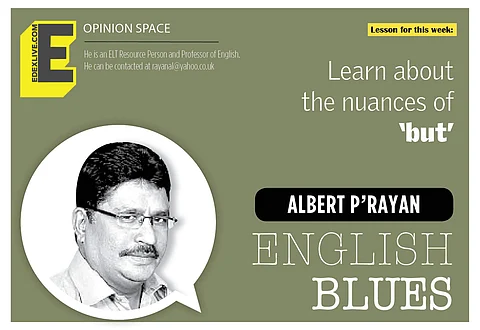

Two young people were talking about their common friend.
Ashok: I met John after a long time. We used to be good friends when we studied together. After he moved to the US for higher studies, we couldn’t be in touch with each other.
Ajay: Hey, are you talking about John Thomas? He is a nice guy but...
Ashok: But…?
When we introduce the word ‘but’ in a sentence, we introduce something new which is in contrast to what we said previously.
Recently, I came across these sentences in a social media post: “This evening, I listened to a presentation by Dr Sowmya Swaminathan, Chief Scientist, World Health Organization. She is an extraordinary person. She has enormous knowledge but is very practical also.”
We can understand the message as intended by the writer. There are two issues in the sentence: “She has enormous knowledge but is very practical also.” The first issue is the use of the word ‘but’ and the second issue is that the sentence does not have a parallel structure.
Let’s discuss the first issue. What does the word ‘but’ mean? When do we use it? ‘But’ is used to introduce a phrase or clause contrasting with what has already been mentioned. Here are examples:
John is rich but stingy, whereas Peter is poor but generous.
Mary is 91 but she is active.
Shailaja Teacher is a good administrator but she has not been allotted a ministerial berth in the new cabinet.
In 1990, the top one per cent in India earned 11 per cent of the country’s income but in 2019, the top one per cent earned 21 per cent.
‘But’ negates everything that goes before it. When we use the word ‘but’ in a sentence, people who listen to us pay more attention to the second part of the sentence that occurs after ‘but’. In order to convey the meaning effectively, we need to be very careful when we use the word.
What does the sentence, “She has enormous knowledge but is very practical also” imply? The sentence is ungrammatical and I am not going to discuss it here. The focus is on the use of the word ‘but’. The sentence implies that those who have enormous knowledge are not practical. The author wants to convey the message that Dr Swaminathan is both knowledgeable and practical.
What does the expression ‘but me no buts’ mean? When we don’t want to hear any excuse from someone, we use the expression. It is an outdated expression but some people still use it in their conversations. Here are some examples:
All but three of my classmates attended the party.
She can come to any restaurant but Mount View.
Here, the word ‘but’ is used as an alternative to ‘except (for)’ or ‘apart from’.
I don’t mind making jokes, but I don’t want to look like one – Marilyn Monroe
